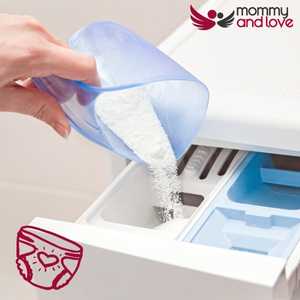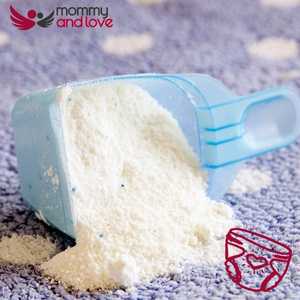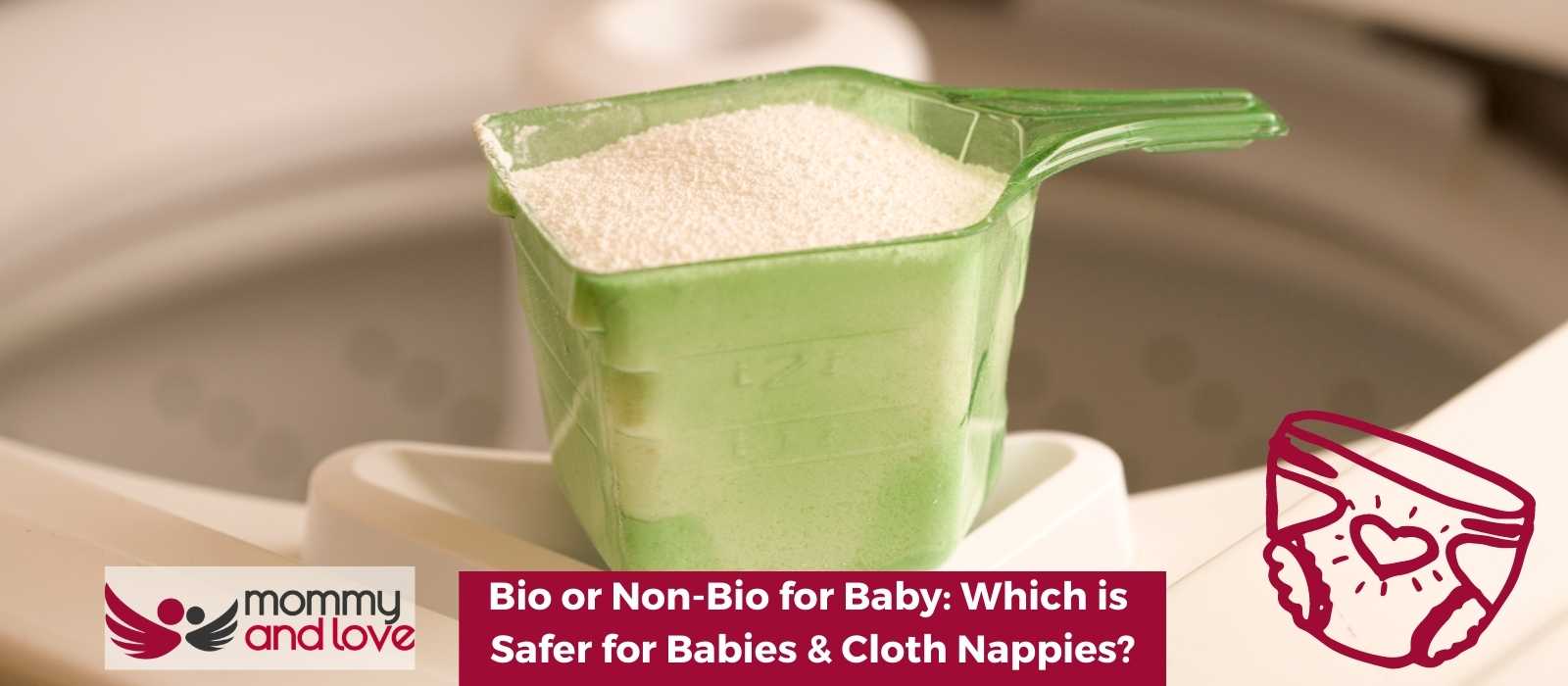We all want what’s best for our babies. Whether you’re a new mum or an expectant one, there are many decisions that need to be made when it comes to your child’s environment and upbringing. One of these is which kind of washing detergent should you choose – bio or non-bio? This is a particularly hot topic for reusable nappy users, but is relevant to all new parents!
Bio or Non-Bios for Baby

Non-bio washing detergents are used by a majority of households in UK.
However, there has been an increase in the use of bio washing detergents over the last few years due to people becoming more environmentally aware and concerned about pollution.
Nowadays, many families who previously only ever used non-bio products are switching to bio, and there is a large community of parents who use both.
Bio washing detergents contain harsh chemicals such as sodium hydroxide and potassium hydroxide whereas non-bios do not and predominantly consist of surfactants (detergent molecules that surround dirt particles). The main concern when choosing a washing powder is the pH level.
Bio Detergents have been known to add alkalinity into the water, which can cause skin irritations and discomfort for babies that are sensitive. There has also been some evidence of bio detergents causing nappy rash in children who suffer from eczema or other pre-existing conditions.
Non-bio washing detergents are much gentler on the skin and have a lower pH level. They also act as degreasers which make them very effective at removing stains from cloth nappies. This is why they are favoured by many parents using reusable nappies. Although non-bios can cause some irritation to the skin if they come into contact with it, as long as you follow usage instructions and rinse well, your child’s clothing should be fine.
Bio detergents are not that great at removing stains from cloth nappies but this is why there are some specially designed bio-safe washing powders on the market specifically for use with reusable
Bio vs Non Bio Washing Powder – What’s the Difference?
Bio and non-bio is the most prevalent forms you come across in the supermarkets. Biological detergents contain enzymes that simplify the removal of dirt that accumulates in our clothes. The enzymes contained in the biological washing detergent break down proteins making washing easy even for sensitive skin a little bit tricky. Non-bio clothing is better when clothes are washed on babies and small children to protect their naturally sensitive skin. Bio ought not be used on fragile items such as wool or silk; so the answer to non-bio vs bio really depends on how the washing machine works. Smelly fitness gear or stained attire? Bio’s what I mean?
Biological clothes detergents contain enzymes that help break down sugary, greasy or starchy compounds. Non-biological detergents are not containing these enzymes and can be kinder near sensitive skin which makes it popular for families with sensitive skin. Good non-biological laundry detergents containing Persil still have powerful cleaning agents that ensure fresh clothing leaves the washer clean and neat. You just could only have to use slightly higher temperatures when washing with nonbiologists or when dealing especially with particularly difficult stains. For further information, you could find information about the difference between bio and non.
List the advantages of non-bio laundry detergent?
Non-Bio is hypoallergenic and dermatologically tested making it gentle over sensitive skin. When bacteria remain on clothing after washing and rubs on the skin some have minor reactions. Many new parents opt for non-bio detergents due to how they can clean up any stains from their kids. The skin care research has been acknowledged by the British skin foundation. There are no commercial laundry detergents that are effective for people with serious skin disorders. Please consult an expert unless you are suffering from severe or unusual sensitive skin. Please note there isn’t any effective laundry. Detergents. Yes. Sure it will come true.
List the advantages of bio detergent?
Biological clothes detergent contains enzymes that help remove tougher stains from your clothes. After one wash they quickly remove the stains even at high temperatures. This mainly helps you save time and energy but is also effective in the washing of clothes and bedding without causing a high temperature which could damage delicate fabrics. If your children are active you can add any Persil Bio dish soap to them to take them away quickly. If you have a lot of messy kids you can throw them into the machine and clean them once again.
When should I use bio or non bio detergents?
If they’re more like babies instead of grown children you could get it easier using biological detergents. It is a biological system. It helps primarily by making an enzyme that eliminates stain residue. This is really great at a lower temperatures (30 degrees Celsius is ideal for them if used quickly). If any member of your household is sensitive you should use Nonbio detergent. Non-Bio detergent and Comfort Pure is an excellent combination for parents who want to wrap their children in clean, soft clothing and help to reduce the risk of skin irritation; our researchers even recognized. Non-bio washing powders bio baby clothes difference between bio and non-washing clothes
Is biological washing powder bad for nappies?

Non biological washing powder stain removing enzymes harsh chemicals non bio products are fine.
But when to use non biological detergent to remove stains laundry detergents for reusable nappies just don’t use liquid detergents or a liquid capsules for nappeis you can to wash clothes.
On tough stains bio detergents make work better. Remember to use the long wash cycle when washing nappies for full details on washing nappies guide see here. . Also check out our how to strip washable nappies guide.
The best detergent for nappies is the one you use daily but do follow manufacturer guidelines. Bio powder can damage cellulose nappies like bamboo and cotton, it will eventually eat away at the fabric so is not good on delicate materials like bamboo. Also avoid those scented washing powders even those with a gentle perfume especially for a young baby. Enzyme free lower temperatures common stains and skin complaints can happen. The main difference between the two is enzymes.
Is washing powder bad for skin?
Some people have skin disorders finding bio detergents irritate the skin and opt not for bio alternative. Some scientific claims indicate Bio doesn’t have problems when it comes in terms of skin irritation. If you’re concerned about your skin and skin’s pH check this article to see how it should be tested.
Does bio washing powder fade clothes?
Biowashing causes a small fading of clothes. This comes into play through additional factors the agitation of the washer cycle and the heat a dryer produces and the temperature of the.
What does non-bio mean in laundry products?
The non bio chemical soap contains no enzymes and is often best suited for those with sensitive skin. In safe non-biological products the cleaning chemicals are softer but still are effective when cleaning clothes and fabric. Some labels may rely on hot water as well as chemicals to get grease off of fabrics. However, in many brands, cleaner chemicals can be harsher and may use hot water.
Is non-bio better for the environment?
Many non-bios still contain nonbiodegradable surfactants, phosphates and other chemicals that are not exactly eco-friendly. Our products are designed to protect Earth. They generally come from plants or other sustainable ingredients, aren’t tested for animals and also do not affect the marine environment as much.
Eco-friendly biological detergents
Method’s Concentrated Laundry Liquid is excellent at combating staining and works superbly at low temperatures. Likewise Ecoline and Ecover provide outstandingly clean biologicals. Or it might be Methods confectrated washroom products.
Does non-bio work as well as biological washing powder?
These days, non-bio-detergents are very effective and will receive much more marks. Sometimes you just needed a small amount of a stain removal product to remove stubborn marks.
Environmental Concerns
Enzymes can safely clean at smaller temperature (30-53°C) and quicker cycles using the lock and key system. Faith in Nature Super Concentrated Laundry Liquids do not contain enzymes or parabens. Non Bio laundry detergent is a 5-litre ‘fillable bottle’ with insufficient enzyme levels or phosphate. Ecozone non-bio capsules can be used at 30°C and are more durable than bio detergents. For bulk purchases Faith in Nature super concentrated laundrry liquid is a 5-liter refillable bottles.
Does biodetergent kill bacteria?
In terms of bacteria, 60 degrees in washing the cloth help to combat them more efficiently. When washing at an temperature over 70 degrees it stops enzyme reaction in which fats are broken down to make the body fat and oils. It is unlikely that bacteria which lives inside our machines or garments can cause physical damages or even death.
Which is better for the environment bio or non bio?
Bio is best used for longer colder cycles which conserve energy. Bio detergents leave their traces on the air longer than a biodetergent does. For ecologically friendly treatment, we recommend Ecozone Non-Food – Laundry Capsules. The Faith in Nature super concentrated laundries liquid is the finest solution of laundry detergent with bio.
Why do babies use non-bio?
When used in bio-degradable cleaning products they can irritate your baby’s delicate skin. Persil non-bio washing detergent is designed to address babies sensitive skin. It is approved by the British Skin Foundations.
Is non-bio better for colour?
Enzymes and bleach in chemical agents cause quicker damage of paint. Even with bleach removing enzyme cleansers some non-biological deterred still can fade, but not as quickly as a bleach cleaner.

This article was written by: Gian MIller – Full-Time Writer, Baby Whisperer & Dad of 3.
Gian spends a lot of his time writing. A self-proclaimed baby whisperer, Gian has been through it all with his own children and is passionate about sharing his hard-won wisdom with other parents. When he’s not writing or changing diapers, you can find him playing the guitar or watching baseball (or preferably both at the same time).




